高一英语1月月考试题
高一英语第一次月考试题
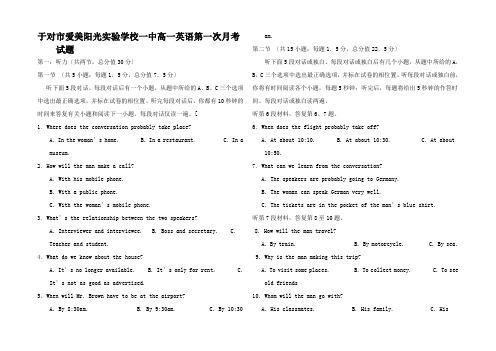
于对市爱美阳光实验学校一中高一英语第一次月考试题第一:听力〔共两节,总分值30分〕第一节〔共5小题;每题1.5分,总分值7.5分〕听下面5段对话。
每段对话后有一个小题,从题中所给的A、B、C三个选项中选出最正确选项,并标在试卷的相位置。
听完每段对话后,你都有10秒钟的时间来答复有关小题和阅读下一小题。
每段对话仅读一遍。
[1.Where does the conversation probably take place?A. In the woman’s home.B. In a restaurant.C. In amuseum.2.How will the man make a call?A. With his mobile phone.B. With a public phone.C. With the woman’s mobile phone.3.What’s the relationship between the two speaker s?A. Interviewer and interviewee.B. Boss and secretary.C.Teacher and student.4.What do we know about the house?A. It’s no longer available.B. It’s only for rent.C.It’s not as good as advertised.5.When will Mr. Brown have to be at the airport?A. By 8:30am.B. By 9:30am.C. By 10:30am.第二节〔共15小题;每题1.5分,总分值22.5分〕听下面5段对话或独白。
每段对话或独白后有几个小题,从题中所给的A,B,C三个选项中选出最正确选项,并标在试卷的相位置。
听每段对话或独白前,你将有时间阅读各个小题,每题5秒钟;听完后,每题将给出5秒钟的作答时间。
高一英语上学期第一次月考试题高一全册英语试题_01
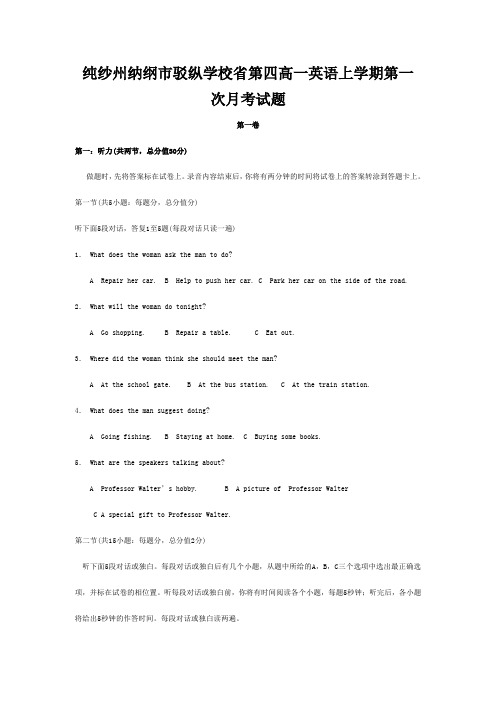
纯纱州纳纲市驳纵学校省第四高一英语上学期第一次月考试题第一卷第一:听力(共两节,总分值30分)做题时,先将答案标在试卷上。
录音内容结束后,你将有两分钟的时间将试卷上的答案转涂到答题卡上。
第一节(共5小题:每题分,总分值分)听下面5段对话,答复1至5题(每段对话只读一遍)1. What does the woman ask the man to do?A Repair her car.B Help to push her car.C Park her car on the side of the road. 2. What will the woman do tonight?A Go shopping.B Repair a table.C Eat out.3. Where did the woman think she should meet the man?A At the school gate.B At the bus station.C At the train station.4. What does the man suggest doing?A Going fishing.B Staying at home.C Buying some books.5. What are the speakers talking about?A Professor Walter’s hobby.B A picture of Professor WalterC A special gift to Professor Walter.第二节(共15小题:每题分,总分值2分)听下面5段对话或独白。
每段对话或独白后有几个小题,从题中所给的A,B,C三个选项中选出最正确选项,并标在试卷的相位置。
听每段对话或独白前,你将有时间阅读各个小题,每题5秒钟;听完后,各小题将给出5秒钟的作答时间。
每段对话或独白读两遍。
听第6段材料,答复6至8题6. How long does the woman usually clean the house on Monday mornings?A Half an hour.B One hour.C Two hours.7. What does the woman usually do on Saturdays?A She goes swimming.B She plays basketball.C She goes shopping. 8.When does the woman usually go to the cinema with friends?A On Friday nights.B On Saturday nights.C On Sunday nights.听第7段材料,答复9至11题9. What does the man ask the woman to do?A Drive him to the airport.B Prepare breakfast for him.C Call him tomorrow morning.10.What time will the man’s flight take off?A At6:30a.mB At7:00a.mC At 8:30a.m11. Where does the conversation probably take place?A In a hotel.B At an airport.C In a restaurant.听第8段材料,答复12至14题12.Why did the man’s parents move to Miami?A It is a good place to be on holidays.B It is a perfect place to do business.C The houses there are cheap.13.What do the man’s parents do every evening?A Swim.B Take a walk.C Lie down on the beach.14. What is the weather like in Miami?A It never rainsB It’s always cloudy.C It’s not always sunny.听第9段材料,答复15至17题15.What is the girl’s first problem?A She is lonely.B She has poor skin.C She has no money to buy snacks.16 What do we know about the girl’s parents?A They are too busy.B They like junk food.C They have no friends.17. What will the man do during the second part to the show?A Phone back.B Discuss the lessons with the girl.C Find someone for the girl to talk to.听第10段材料,答复18至20题18. What is the biggest prize in the contest〔竞赛〕?A $10,000.B $1000.C $120.19. What do you need in order to join the contest?A A Safeway Rewards Card.B A receipt from any Safeway store.C An email address and a photo ID.20. What should you do if you are a winner?A Call the department every 30minutes.B Claim the prize within one week.C Wait until the prize sent to you.第二:阅读理解〔共两节,总分值40分〕第一节〔共15小题;每题2分,总分值30分〕阅读以下短文,从每题所给的四个选项〔A、B、C和D〕中,选出最正确选项,并在答题卡上将该项涂黑。
高一英语上学期第一次月考试卷含解析 试题
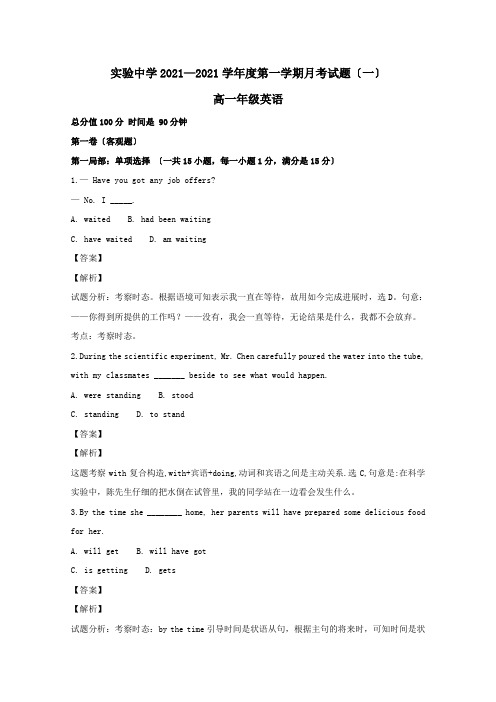
实验中学2021—2021学年度第一学期月考试题〔一〕高一年级英语总分值100分时间是 90分钟第一卷〔客观题〕第一局部:单项选择〔一共15小题,每一小题1分,满分是15分〕1.— Have you got any job offers?— No. I _____.A. waitedB. had been waitingC. have waitedD. am waiting【答案】【解析】试题分析:考察时态。
根据语境可知表示我一直在等待,故用如今完成进展时,选D。
句意:——你得到所提供的工作吗?——没有,我会一直等待,无论结果是什么,我都不会放弃。
考点:考察时态。
2.During the scientific experiment, Mr. Chen carefully poured the water into the tube, with my classmates _______ beside to see what would happen.A. were standingB. stoodC. standingD. to stand【答案】【解析】这题考察with复合构造,with+宾语+doing,动词和宾语之间是主动关系.选C,句意是:在科学实验中,陈先生仔细的把水倒在试管里,我的同学站在一边看会发生什么。
3.By the time she ________ home, her parents will have prepared some delicious food for her.A. will getB. will have gotC. is gettingD. gets【答案】【解析】试题分析:考察时态:by the time引导时间是状语从句,根据主句的将来时,可知时间是状语从句用一般如今时代替一般将来时,句意:到她到假的时候为止,父母将已经为她准备了可口的食物。
选D。
考点:考察时态点评:时间是和条件状语从句用一般如今时代替一般将来时,用如今完成时代替将来完成时。
2023-2024高一上学期第一次英语月考试卷
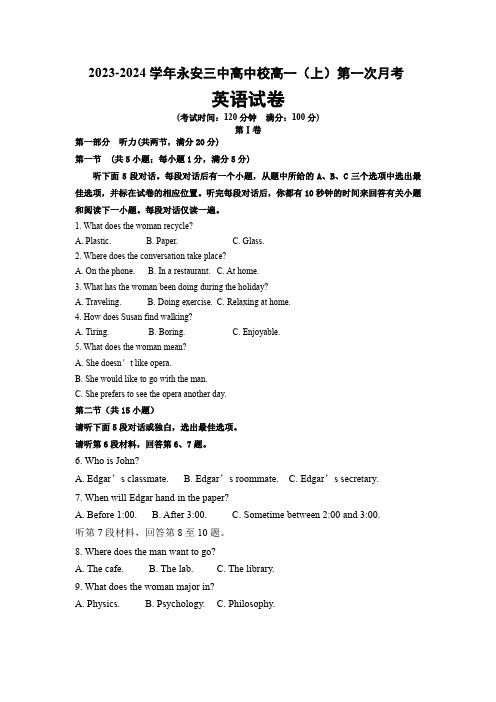
2023-2024学年永安三中高中校高一(上)第一次月考英语试卷(考试时间:120分钟满分:100分)第Ⅰ卷第一部分听力(共两节,满分20分)第一节(共5小题;每小题1分,满分5分)听下面5段对话。
每段对话后有一个小题,从题中所给的A、B、C三个选项中选出最佳选项,并标在试卷的相应位置。
听完每段对话后,你都有10秒钟的时间来回答有关小题和阅读下一小题。
每段对话仅读一遍。
1. What does the woman recycle?A. Plastic.B. Paper.C. Glass.2. Where does the conversation take place?A. On the phone.B. In a restaurant.C. At home.3. What has the woman been doing during the holiday?A. Traveling.B. Doing exercise.C. Relaxing at home.4. How does Susan find walking?A. Tiring.B. Boring.C. Enjoyable.5. What does the woman mean?A. She doesn’t like opera.B. She would like to go with the man.C. She prefers to see the opera another day.第二节(共15小题)请听下面5段对话或独白,选出最佳选项。
请听第6段材料,回答第6、7题。
6. Who is John?A. Edgar’s classmate.B. Edgar’s roommate.C. Edgar’s secretary.7. When will Edgar hand in the paper?A. Before 1:00.B. After 3:00.C. Sometime between 2:00 and 3:00.听第7段材料,回答第8至10题。
高一英语上学期第一次月考试题(含答案)

第一次月考高一英语试卷第一部分阅读(共两节,满分50分)第一节(共15小题;每小题2.5分,满分37.5分)阅读下列短文,从每题所给的A、B、C和D四个选项中,选出最佳选项。
Choose Your One-Day Tours!Tour A-Bath&Stonehenge including entrance fees to the ancient Roman bathrooms and Stonehenge£37until26March and£39thereafter.Visit the city with over2,000years of history and Bath Abbey,the Royal Crescent and the Costume Museum,Stonehenge is one of the world's most famous prehistoric monuments dating back over5,000years.Tour B-Oxford&Stratford including entrance fees to the University St Mary’s Church Tower and Anne Hathaway’s-£32until12March and£36thereafter.Oxford:Includes a guided tour of England’s oldest university city and colleges.Look over the“city of dreaming spires(尖顶)”from St Mary’s Church Tower.Stratford:Includes a guided tour exploring much of the Shakespeare wonder.Tour C-Windsor Castle&Hampton Court:including entrance fees to Hampton Court Palace -£34until11March and£37thereafter.Includes a guided tour of Windsor and Hampton Court, Henry VIII’s favorite palace.Free time to visit Windsor Castle(entrance fees not included).With 500years of history,Hampton Court was once the home of four Kings and one Queen.Now this former royal palace is open to the public as a major tourist attraction.Visit the palace and its various historic gardens,which include the famous maze(迷宫)where it is easy to get lost!Tour D-Cambridge including entrance fees to the Tower of Saint Mary the Great-£33until 18March and£37thereafter.Includes a guided tour of Cambridge,the famous university town, and the gardens of the18th century.1.Which tour will you choose if you want to see England's oldest university city?A.Tour AB.Tour BC.Tour CD.Tour D2.Which of the following tours charges the lowest fee on17March?A.Windsor Castle&Hampton CourtB.Oxford&StratfordC.Bath&StonehengeD.Cambridge3.Why is Hampton Court a major tourist attraction?A.It used to be the home of royal familiesB.It used to be a well-known mazeC.It is the oldest palace in BritainD.It is a world-famous castleB“I have cancer.”Mom said and held me in a tight hug.I could feel her chest shaking as she tried not to cry but failed.For all of my twenty-four years,my mom had been supportive.Strength and protection had always flowed from her to me.Now I knew it would have to flow the other way.Mom didn’t stay down for long.After the shock of breast-cancer,she armed herself with a notebook and a pen and a thousand questions for the doctors.She took notes on white blood cell counts and medications(药物)with long names as though she were studying for entrance exams into medical school.The not-knowing is the worst.”she said.The operation was successful.The chemo(化疗)was the harder part.I went with Mom to every chemo treatment.She rarely complained,though her hair was gone and her toenails and fingernails fell out one by one.She joked that she could save money on nail polish and put it toward the doctor bills,even though she never wore nail polish.”Cancer can take my hair,my nails,my health,my very life.But it can’t take my smile.”Mom said.Mom learned to share her fears with me,and it formed an even deeper bond between us.Yet I am certain there were fears she didn’t share because she was still protecting me-worries she only shared with Dad.Even in the darkest hours,she would just joke about the cancer.Mom always said,”When you look your greatest fear in the eye and laugh at it,you take away some of its power.”Mom was one of the lucky ones.She did beat her cancer,though not without scars.From her, I’ve learned I may not get to choose what I face,but I do get to choose how I face it.4.What does the underlined sentence in Paragraph2mean?A.There were other ways to treat cancer.B.Knowledge of cancer would be helpful.C.Mom had to stay stronger to beat cancer.D.I should be the one being there for Mom.5.Which of the following words can best describe Mom?A.Humorous and generous.B.Considerate and ambitious.C.Optimistic and determined.D.Caring and knowledgeable.6.What is the fifth paragraph mainly about?A.The fear Mom shared with me.B.The ways Mom faced fear.C.The jokes Mom told me.D.The bond Mom and I formed.7.What lesson did the author learn from Mom?A.Luck counts in beating diseases.plaint does no good to one’s health.C.Positive attitudes get one through hardships.D.Sharing feelings helps reduce sufferings a lot.CA robot created by Washington State University(WSU)scientists could help elderly people with dementia(痴呆)and other limitations live independently in their own homes.The Robot Activity Support System,or RAS,uses sensors installed in a WSU smart home to determine where its residents are,what they are doing and when they need assistance with dailyactivities.It navigates(定位)through rooms and around obstacles to find people on its own, provides video instructions on how to do simple tasks and can even lead its owner to objects like their medication or a snack in the kitchen.“RAS combines the convenience of a mobile robot with the activity detection technology of a WSU smart home to provide assistance in the moment,as the need for help is detected,”said Bryan Minor,a postdoctoral researcher in the WSU School of Electrical Engineering and Computer Science.Currently,an estimated50percent of adults over the age of85need assistance with every day activities such as preparing meals and taking medication and the annual cost for this assistance in the US is nearly$2trillion.With the number of adults over85expected to triple by2050, researchers hope that technologies like RAS and the WSU smart home will relieve some of the financial strain on the healthcare system by making it easier for older adults to live alone.RAS is the first robot that researchers have tried to incorporate into their smart home environment.They recently published a study in the journal Cognitive Systems Research that demonstrates how RAS could make life easier for older adults struggling to live independently.“While we are still in an early stage of development,our initial results with RAS have been promising,”Minor said.“The next step in the research will be to test RAS’performance with a group of older adults to get a better idea of what prompts,video reminders and other preferences they have regarding the robot.”8.How does RAS serve elderly people?A.Through sensors.B.Through objects.C.Through a mobile robot.D.Through their daily activities.9.What can we know about RAS?A.It is the first robot used in daily life.B.Its function remains to be tested.C.It can locate people and do any task.D.It can cook for owners on its own.10.What’s Minor’s attitude toward the future of RAS?A.Doubtful.B.Negative.C.Optimistic.D.Uncertain.11.What can be a suitable title for the text?A.Elderly people leave the nursing home.B.Smart Home Tests first elder-Care robot.C.RAS,the first robot to make home smart.D.Older adults have benefited from RAS.DWhat kind of amusing activities will you participate in during your life?Will you be spending your free time doing safe sports with little danger or will you always be one of the first people to try the next popular extreme activity?Scientists have been interested in finding out why some people seem to prefer dangerous activities.Although there are exceptions,researchers have found that in most cases men are less cautious than women.Men often try to impress women by proving that they are courageous andfearless,and they are more likely to take risks when women are watching them or when they are competing against other men.Research also shows that as people get older they usually behave more responsibly and avoid taking unnecessary risks.In addition,when people are in stable relationships,they seem to be less attracted to daring activities.Some people seem to be more daring than others,but there are many different types of risks and some people take one type of risk,but not another.Psychologists have identified a number of categories of risk.These include financial risks,risks related to health and safety,amusing risks and social risks.Psychologists discover that some people will take risks in one area,but not in another.Just if a person enjoys bungee(蹦极)jumping,it doesn’t mean he or she will take chances when investing(投资)money or that he will tell a joke to a group of strangers.Interestingly,research shows that women take more social risks than men.They are more likely to make career changes as they get older and to express unpopular opinions in business meetings.Yet,at the end of the day,the likelihood of particular people taking a risk depends on their personalities.In general,optimistic people are more likely to take risks because they focus on the possible positive outcomes of their actions.On the other hand,those with opposite personality are much more likely to avoid taking a chance.12.Why do men try to prove they are brave according to the research?A.To attract people’s attention.B.To take on more responsibility.C.To make favorable impressions on people.D.To develop stable relationships with others.13.What does the example of bungee jumping indicate?A.People take one type of risk but not another.B.There are more than one type of risk.C.Bungee jumping is dangerous but popular.D.Some people are more courageous than others.14.What have researchers discovered about women?A.They are willing to take social risks.B.They are always changing Jobs.C.They are good at doing business.D.They are usually more conservative than men.15.What mainly determine whether people take risks possibly?A.Their personalities.B.Their financial conditions.C.Their social relationships.D.Their expectations of outcomes.第二节(共5小题;每小题2.5分,满分12.5分)根据短文内容,从短文后的选项中选出能填入空白处的最佳选项,选项中有两项为多余选项。
高一1月月考英语试题(有答案)
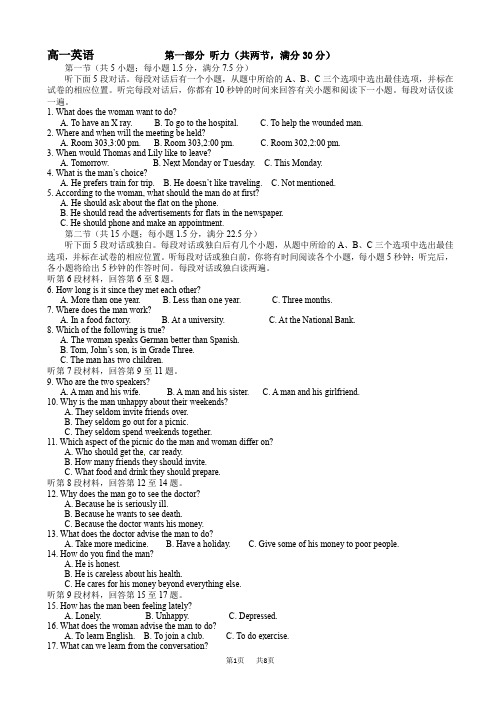
高一英语第一部分听力(共两节,满分30分)第一节(共5小题;每小题1.5分,满分7.5分)听下面5段对话。
每段对话后有一个小题,从题中所给的A、B、C三个选项中选出最佳选项,并标在试卷的相应位置。
听完每段对话后,你都有10秒钟的时间来回答有关小题和阅读下一小题。
每段对话仅读一遍。
1. What does the woman want to do?A. To have an X ray.B. To go to the hospital.C. To help the wounded man.2. Where and when will the meeting be held?A. Room 303,3:00 pm.B. Room 303,2:00 pm.C. Room 302,2:00 pm.3. When would Thomas and Lily like to leave?A. Tomorrow.B. Next Monday or T uesday.C. This Monday.4. What is the man’s choice?A. He prefers train for trip.B. He doesn’t like traveling.C. Not mentioned.5. According to the woman, what should the man do at first?A. He should ask about the flat on the phone.B. He should read the advertisements for flats in the newspaper.C. He should phone and make an appointment.第二节(共15小题;每小题1.5分,满分22.5分)听下面5段对话或独白。
每段对话或独白后有几个小题,从题中所给的A、B、C三个选项中选出最佳选项,并标在试卷的相应位置。
高一英语第一次月考试题与答案

高一第一次月考英语试卷时间 90 分钟满分120分第一部分:阅读理解(共20 小题,每题 2 分,满分 40 分)阅读下列短文,从每题所给的四个选项(A 、 B 、C、 D)中,选出最佳选项,并填写在答题卡上AOur sun is a star, and nine worlds (天体 ) move round it. Worlds like these are planets. But there are other stars, other suns, not only thousands of them, but millions of them. Do different stars have planets? We can see the planets round our own sun. but we haven ’ t been anymore. The stars are too far away from us. Stars give out light, but the planets don ’ t have any light of their own. So we cane them. They’aretsetoo far, and too dark. Still, we can tell that some stars have planets. While a big planet goes round, it pulls its star to one side. And sometimes we can see this. Then we know that the star has a planet. For example, Barnard ’Stars is a small red star. And it is the quickest star in the universe. But sometimes it moves slower, and then quicker again. We have known Bernard ’ s Star for many years, and now we are sure it has a planet.1. A star is a large body in the universe. It _________.A. moves round our sunB. has light of its ownC. can also be called a sunD. both B and C2. Which of the following is not true?A. The earth is one of the sun’s s worldB. There are millions of suns in the universeC. The worlds are very brightD. some stars have planets3. We can see the planets round our sun. But we can’ t see ________.A. nine worlds in the universeB. the planets round other starsC. the satellites round the earthD. other stars4. Barnard ’ s Star moves more quickly than ________.A. most starsB. any other starC. its planetD. the planets round the sun5. How can people know that there is a planet round Barnard’ s Star?A. Sometimes they see that the planet pulls the star to one side and makes itmove slower.B. The planet is shiningC. The planet is next to our earth.D. The planet is a red one.BMany people hurt their backs when they try to lift heavy things from the floor. It is easy to hurt your back muscle(肌肉 ) when you try to pick up a heavy thing. However, there is a correct way to lift things from the floor. If you pick up heavy things correctly, you probably will not hurt your back.To lift something from the floor correctly, first bend ( 弯曲 ) your knees and lower yourself. Keep your back straight. Do not bent over, from your waist ( 腰 ) keep your back and hips (臀部 ) and waist in a line. If you bent over, the muscles in your lowerback can became hurt very easily. If you keep your back and hips straight, the muscles are stronger, because they hold up together. The other muscles can then help the lower back muscles.As you lower yourself, try to get as close to thing as you can, put one knee oneach side of the thing. Remember at all times to keep your back straight. Put your hand under the thing that is in front of you, between y our knees.To lift the thing, you should stand up slowly. Use your leg muscles in order tostand up. In other words, lift with your legs, not with your back.6.Which part of your body is more easily to be hurt when you lift heavy things?A. The leg muscles.B. The back musclesC. The hipsD. The knees7.Many people hurt their backs when they lift something because _______.A. they are not strongB. the things are very heavyC. the way to lift the things is not correct.D. they are very heavy8.The muscles are stronger if you _______.A. keep your back, hips and waist in a lineB. bend over from your waistC. lower yourselfD. get down on your knees9. To lift heavy things, the most important of all is to _________.A. stand up slowlyB. keep your back straightC. bend your kneesD. put one knee on each side10. What does“ In other words” mean? ________A.总而言之B、换句话说C、在其它话中D、在其它单词中CTV PROGRAMMESChannel 1Channel 218:00Around China17:45Computers today18:30Children ’ s programme 18:10Foreign arts19:00News18:30English classroom19:30Weather report19:00Animal world19:40Around the world19:25China ’ 9920:10TV play: Sisters20:20Sports21:00English for today21:00TV play: Guo Lanying21:15Popular music21:45English news21:55Talk show22:06On TV next week11. If you want to watch a football game, the best programme for you wouldbe _____.A. TV playB. SportsC. Around the worldD. Talk show12.The programme of ______ will let you know much aboutwestern countries.A. SistersB. Around ChinaC. Around the worldD. On TV next week13.If you want to know something about tigers, elephants and monkeys, the best programme for you is __________.A. Around ChinaB. Animal worldC. TV playD. Foreign arts14. English classroom is a programme that _________.A. lets you know something about classroomsB. tells you something about studentsC. lets you know something about school lifeD. teaches you English15. The programme at the end of Channel 2 means _______ on TV next week.A. newsB. programmesC. peopleD. placesDThe world is not only hungry, but it is also thirsty for water. This may seem strange to you, since nearly 70% of the earth's surface is covered with water. But about 97% of that is sea water, or salt water. Man can only drink and use the other 3%—— the fresh water from rivers, lakes, underground, and other sources. And we can not even use all of that. Even worse, some of it has been made dirty.However, as things stand today, this fresh water is still enough for us. But ourneed for water is becoming larger and larger quickly —— almost day by day. We should take steps to do with this problem now and in this way we can get away from a serious world wide water shortage (缺少 ) later on.We all have to learn how to stop wasting our valuable water. One of the first steps is to develop ways of reusing it. Today in most l arge cities, water is used only once and then sent out into a sewer system(下水道 ). From there it returns to sea or runs into underground places.But even if every large city reused its water, we still would not have enough. All we'd have to do to make use of sea water in the world is to remove the salt. If we take these steps we'll be in no danger of drying up.16.The world is thirsty for water because.A. man hasn't got enough food to eatB. we haven't got enough fresh waterC. only 70% of the earth's surface is waterD. more water is sent into sewer systems17.The underlined word valuable means.A. much and saltyB.fresh and enoughC. dear and usefulD. clean and helpful18.What should we do if we want to have enough fresh water?(a)Make full use of the sea water.(b)Carry salt water into lakes or rivers.(c)Try to save the fresh water as much as possible.(d)Do our best to use the water again.(e)Drink and use all the water on the earth's surface.A.(c)and(e)B.(a)and(d)C.(a),(c)and(d)D.(b),(d)and(e)19.The best but the most difficult way to solve (解决 ) the water problem of theworld is to.A. remove the salt from sea waterB.make the water in cities cleanC. take water from undergroundD.make the need for water smaller20.What's the best title (标题 ) for this passage?A. The Importance of the WaterB. The World's Water ProblemC. The Thirsty WorldD. Fresh Water and Sea Water第二部分:完形填空(共20 小题,每小题 1.5 分,满分 30 分)阅读下列短文,从短文后所给的四个选项(A 、B 、C、D )中,选出可以填入空白处最佳选项,并将答案填写在答题卡上Do you know how many languages there are in the world? There are about1, 500, but many of them are not considered very21.English is considered one of the most important languages because many people 22it, not only in England and America,23in other countries of the world.About200, 000, 000 speak it 24their own language, and another 230, 000, 000 use it as25language. It is 26to say how many people are learning it.27boys and girls in schools a re trying to do so.Many 28 children study French. French is also a very important language.29children study German, Russian, Japaneseand Chinese.Which is the best30to learn a language? We know that we all learnt31 language well when we were32. If we learn a second language in the33 way, it may not seem so difficult.What does a small child do? It34what peo ple say, and it tries to guess what it hears.When it wants something, it has to3 5it. It is using the language,36and talking in it all of the time. If peopleuse a second language37,they will learn it38.In school, you learn to read, to write,to hear and to39. It is best to learn all new words through the40. You can read them, spell them and speak them later.21. A. spoken B. happy C. important D. ideal(理想的 )22. A. like B. use C. operate D. play23. A. but B. and C. too D. so24. A. like B. with C. for D. as25. A. distant B. a second C. the second D. a special26. A. easy B. again C. difficult D. best27. A. Millions of B. Hundreds of C. Tens of D. Thousands of28. A. Chinese B. Japanese C. English D. Asian29. A. Some B. Thousands C. All D. Much30. A. time B. way C. thing D. place31. A. a foreign B. our mothers' C. other's D. our own32. A. born B. children C. grown D. boys33. A. same B. different C. useful D. good34. A. talks B. wants C. cries D. follows35. A. ask B. want C. get D. ask for36. A. speaking B. writing C. thinking D. doing37. A. some time B. sometimes C. all the time D. for the time38. A. fluent B. confident C. freely D. easily39. A. fight B. sing C. speak D. play40. A. mouth B. hands C. ears D. eyes第三部分:语法填空(共10 小题,每题 1.5 分,满分 15 分)阅读下面材料,在空白处填入适当的内容(1 个单词)或括号内单词的正确形式Britney: Hi, Charlie. Nice to see you again. ___41_ was your summer camp in the United States?Charlie: Good. I went there on July 15th and came back on August 15th. I enjoyed every single day of my stay there.Britney: What did you do at the camp?Charlie: There were various _42___(interest) courses and activities. The American teachers taught us to listen, speak, read and write in English, but _43___(main) to speak. The American classes are quite ___44_(differ) from the Chinese ones. Students are free to ask teachers questions during the class. And they_45___ (encourage) to share their ideas with others. I not only improved my English language, but experienced American culture as_46___Britney: How nice! Where did you stay?Charlie: Oh, I lived with a host family, __47__Johnsons. They were very kind and __48__ (please). They took good care of me. What’ s more, I could___practice49 (speak) English with _50_every day.Britney: How interesting! I wish I could go there some day.41How42 interesting43mainly 44different45are encouraged46well47the48 pleasant 49speaking50 them第四部分:短文改错(共10 小题,每题 1 分,满分 10 分)老师要求同桌同学相互修改作文。
2022-2023学年安徽省马鞍山市当涂县高一上学期第一次月考英语试题(解析版)
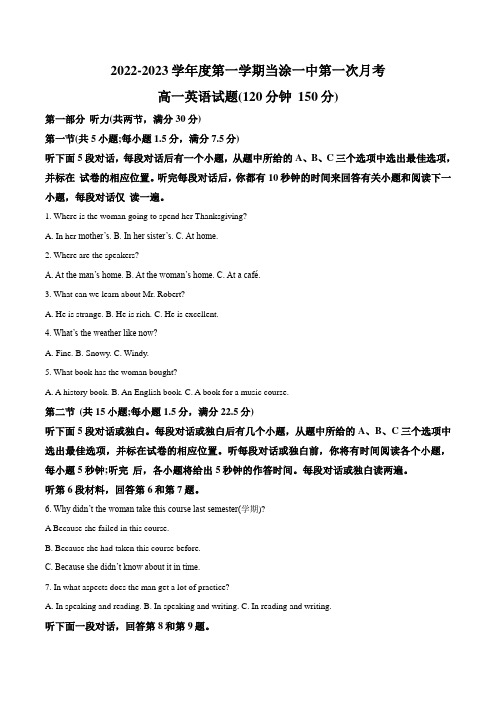
2022-2023学年度第一学期当涂一中第一次月考高一英语试题(120分钟150分)第一部分听力(共两节,满分30分)第一节(共5小题;每小题1.5分,满分7.5分)听下面5段对话,每段对话后有一个小题,从题中所给的A、B、C三个选项中选出最佳选项,并标在试卷的相应位置。
听完每段对话后,你都有10秒钟的时间来回答有关小题和阅读下一小题,每段对话仅读一遍。
1. Where is the woman going to spend her Thanksgiving?A. In her mother’s.B. In her sister’s.C. At home.2. Where are the speakers?A. At the man’s home.B. At the woman’s home.C. At a café.3. What can we learn about Mr. Robert?A. He is strange.B. He is rich.C. He is excellent.4. What’s the weather like now?A. Fine.B. Snowy.C. Windy.5. What book has the woman bought?A. A history book.B. An English book.C. A book for a music course.第二节(共15小题;每小题1.5分,满分22.5分)听下面5段对话或独白。
每段对话或独白后有几个小题,从题中所给的A、B、C三个选项中选出最佳选项,并标在试卷的相应位置。
听每段对话或独白前,你将有时间阅读各个小题,每小题5秒钟;听完后,各小题将给出5秒钟的作答时间。
每段对话或独白读两遍。
听第6段材料,回答第6和第7题。
6. Why didn’t the woman take this course last semester(学期)?A Because she failed in this course.B. Because she had taken this course before.C. Because she didn’t know about it in time.7. In what aspects does the man get a lot of practice?A. In speaking and reading.B. In speaking and writing.C. In reading and writing.听下面一段对话,回答第8和第9题。
- 1、下载文档前请自行甄别文档内容的完整性,平台不提供额外的编辑、内容补充、找答案等附加服务。
- 2、"仅部分预览"的文档,不可在线预览部分如存在完整性等问题,可反馈申请退款(可完整预览的文档不适用该条件!)。
- 3、如文档侵犯您的权益,请联系客服反馈,我们会尽快为您处理(人工客服工作时间:9:00-18:30)。
浙江省诸暨市2017-2018学年高一英语1月月考试题第一部分:听力(共20小题;每小题 1.5分,满分30分)第一节听下面5段对话,每段对话后有一小题,从题中所给的A,B,C三个选项中选出最佳选项,并标在试卷的相应位置,听完每段对话后,你都有15秒钟的时间来回答有关小题和阅读下一小题。
每段对话只读一遍。
1.How will the man go home?A.By bike.B.By subway.C.By bus.2.What happened to the woman’s son?A.He hurt his arm.B.He had a headache.C.He got pains in his fingers.3.What will the man do tonight?A.Do his homework.B.Watch Tv.C.Play football.4.What is Mary’s phone number?A.97756431.B.86727151.C.86727115.5.What is the man looking for?A.A computer.B.A cup of tea.C.A book.第二节听下面5段对话或独白,每段对话或独白后有几个小题,从题中所给的A、B、C三个选项中选出最佳选项,并标在试卷的相应位置。
听每段对话或独白前,你将有时间来阅读各个小题,每小题5秒钟;听完后,各小题将给出5秒钟的作答时间。
每段对话或独白读两遍。
听第6段材料,回答第6、7题。
6.What will the woman do for Albert’s birthday?A.Decorate his room.B. Organize a partyC.prepare a big dinner.7.What does the woman ask the man to bring?A.JuiceB. A cake.C. Fruit.听第7段材料,回答第8、9题。
8.What are the speakers mainly talking about?A. An interview.B.An English classC.A piece of homework.9.What did Mr. Gray talk a lot about?A.The methods of learning English.B.The culture of some countries.C.The rules in the classroom.听第8段材料,回答第10至12题。
10.What has the man decided to do for his holiday?A.Go climbingB. Go hikingC. Go camping.11.How long will the man be away?A. Seven days.B. Six days.C. Five days.12.What is the woman’s opinion about hiking and climbing?A.Fun.B. Tiring.C. Relaxing听第9段材料,回答第13至16题。
13.Where does the conversation probably take place?A. At home.B. At school.C. At a restaurant.14.Who does the girl usually talk to when she is upset?A.Her friends.B. Her parents.C.Her teachers.15.Where would the girl talk with her friend?A. In a shopping centre.B. In a classroom.C.In a cafe.16.What does the man suggest the girl do ?A.Study hard.B.Shop with her friends.C.Get in touch with her friends often.听第10段材料,回答第17至20题。
17.Why is the speaker usually hungry by lunchtime?A.She doesn’t eat biscuits at work.B.She only has a drink for breakfast.C.She works very hard.18.When does the speaker end her lunch break?A.At about 1:15B. At about 2:00C. At about 2:1519.What does the speaker drink for lunch?A. Tea.B. Coffee.C. Water20.What does the speaker think of her life?A. Stressful.B. Enjoyable.C. Unhealthy.第二部分:阅读理解(共2节,满分35分)第一节(共10小题;每小题 2.5分,满分25分)阅读下列短文,从每题所给的四个选项(A、B、C和D)中,选出最佳选项,并在答题卡上将该项涂黑。
APollution inside homes and other buildings kills more than 4 million people each year. Many people die as a result of breathing smoke or from cooking over wood-powered or coal-powered stoves.One way to reduce the number of deaths is through cooking equipment(设备)powered by the sun. Crosby Menzies, a solar power expert in a South African company, described his latest solar cooker called the “Sol-4”. “It is four square meters of mirrors, six to eight meters in length. It is quite a large cooker.”The “Sol-4”works by reflecting(反射) light from the sun off large mirrors. The mirrors direct the light at a cooking pan. Then the light heats the pan with solar energy. Within two minutes, the pan is hot enough to cook sausages and onions. In just four minutes, water can be boiled. That is as fast as cooking with natural gas or electricity.The cooker is also much “friendlier”than other models because people do not have to stand in the sun to use it. And people can prepare meals without having to collect firewood or spend money oncoal. Such i ndividuals would be less likely to have breathing illnesses from harmful smoke.At present, the cooker only works when the sun is shining. But engineers are working on a way to make it work with out sunlight.Each cooker costs about $2,000, which is a large amount of money for most Africans. To solve that problem, Crosby Menzies has created a non-governmental organization called Solar Cookers for Africa. It plans to raise money through donations to provide poor people with solar cooking equipment.21.What can we learn about the solar cooker?A. It sells very well. B .It is difficult to use.C. It can’t be moved easily.D. It can only be used to boil water.22.The underlined word“individuals”most probably means___________.A.cookers B.people C.mirrors D.expert23.What can we infer from the test?A. People can’t afford the solar cooker.B. African are willing to accept new technologies.C. it has a long way to make the solar cooker popular.D. Deaths caused by pollution will be greatly reduced.B.My student teaching experience was a wonderful adventure. I had to deal with many discipline and behavior challenges that happened again and again.The greatest part of it was the relationship I developed with two students. One of the students was named Michael, whom I met when I was working for a kindergarten. Before I became a morning bus assistant, I’d heard that Michael was a challenging student who would always shout, stand up on the bus , make fun of other students, and distract bus driver. So I decided that each morning, when he got on the bus, I’d have Michael sit beside me. At first he didn’t like this idea and pouted(撅嘴)about it . But soon he settled down, knowing he had no choice. I began to talk to him about little things outsideof school life, such as his weekend activities and things that he liked to do . I also listened closely to him when he talked and thoroughly responded to his ideas. As I gave Michael the attention that he needed, little by little , he began to behave better and better. His change was noticed by all, by the students and especially the bus driver.Another student I took a special interest in was a boy named Tony, a third grader. To some, Tony seemed to be a slow or passive learner. So I decided to see if I could find a way to motivate(激发)Tony to stay on the task. I would sit in the seat next to him and encourage him through every step of the work he was doing. This helped him to stay motivated and at least the work was getting down on time. Before long, he was paying more attention to his studies, and scoring high on all his tests. I knew that all Tony had needed was to be motivated on a one-on-one basis.24.What is the text mainly about?A.The writer’s best memories of his student teaching experience.B.The two greatest students during the writer’s career as a teacher.C.How to motivate slow student.D.How to deal with naughty students.25.The writer first made Michael sit beside him in order to_______.A. listen to him and know his real thoughtsB. limit (限制)his freedom and his behaviourC. talk to him to change his bad attitudeD. give him attention and teach him to behave well26.Which of the following would probably have nothing to do with Tony?A.He was uninterested in what the teacher was saying .B.He always had a blank sheet of paper on his desk.C.He seemed to look at nothing and think of nothing for a long time.D. He often shouted and stood up to distract the teacher.27.What can we learn from the text?A.Selfless giving is always a pleasure for a teacherB.An act of kindness could bring the students great joy.C.Students should learn to appreciate teachers’concernD.Different students should be taught in different ways.C.Imagine,one day,getting out of bed in Beijing and being at your office in Shanghai in only a couple of hours,and then,after a full day of work,going back home to Beijing and having dinner there.Sounds unusual,doesn't it? But it's not that unrealistic,with the development of China’s high —speed railway system.And that’s not a11.China has an even greater high—speed railway plan—to connect the country with Southeast Asia,and eventually Eastern Europe.China is negotiating(谈判) to extend its own high-speed railway network to up to 17 countries in 1 0 to 15 years,eventually reaching London and Singapore.China has suggested three such projects.The first would possibly connect Kunming with Singapore via Vietnam and Malaysia.Another could start in Urumqi and go through Kazakhstan and Uzbekistan,and possibly to Germany.The third would start in the northeast and go north through Russia and then into Western Europe.The new system would still follow China's high-speed railway standard. And the trains would be able to go 346 kilometers an hour, almost as fast as some airplanes.Of course,there are some technical challenges to overcome.There are so many problems that need to be settled,such as safety,rail gauge(轨距),maintenance of railway tracks.So,it’s important to pay attention to every detail.But the key problem is really money.China is already spending hundreds of billions of yuan on domestic (国内的) railway expansion.China hopes that resources from other countries could stream into China to support development.It’ll be a win-win project. For other countries,the railway network will create more opportunities for business,tourism and so on,not to mention the better communication among those countries.ForChina,such a project would not only connect it with the rest of Asia and bring some much-needed resources,but would also help develop China’s far west.28. According to the passage,the greatest challenge to the new high-speed railway plan is __________.A.technical challenge B.safety of the systemC.money problem D.maintenance of railway tracks29.China’s new high-speed railway plan will be a win-win project because __________ .A.China will get much-needed resources and develop its western regionsB.China and the countries involved will benefit from the project in many waysC.China will develop its railway system and communication with other countriesD.The foreign countries involved will develop their railway transportation,business and tourism30.Which of the following words best describes the author’s attitude towardsChina's high-speed railway plan?A. Critical.B.Disappointed.C.Doubtful D. Positive.第二节(共5小题;每小题2分,满分10分)根据短文内容,从短文后的选项中(A、B、C、D、E、F、G)选出能填入空白处的最佳选项。
